(JTA) — How do you fight antisemitism if you can’t agree on how to define it? And how do you begin to debate the Israeli-Palestinian conflict on campus if activists on both sides are convinced of the other’s animosity?
These are questions that have roiled colleges around the country, including Brown University, the Ivy League university in Providence, Rhode Island. In 2019, undergraduates there voted to boycott some firms dealing with Israel by a more than 2-to-1 margin, leaving pro-Israel students on campus feeling discouraged and alienated. Among Jewish students themselves there were disagreements about Israel and antisemitism, and when criticism of the former turns into the latter.
Seeing those tensions deepen, Rabbi Michelle Dardashti, had launched a collaboration between Brown RISD Hillel and the Brown Office of the Chaplains and Religious Life. Funded by the Dorot Foundation, the Narrow Bridge Project brought students of a diverse set of ideological outlooks together to discuss Jewish peoplehood, Zionism and antisemitism.
This year, some of those students put what they learned into a 130-page guidebook called “Love Thy Neighbor: A Guide for Tackling Antisemitism While Committing to Justice for All” sets out to define antisemitism for the campus community and beyond, discussing both “classic” forms of antisemitism and the ways it can’t be separated from the “flammable subject of Israel/Palestine on campus.”
The five student authors come from diverse ideological and Jewish backgrounds — from a leader of a pro-Israel campus group to a self-described anti-Zionist. The result makes for uncomfortable reading on all sides, in that it acknowledges how one person’s national liberation movement is another’s “colonialist” project.
That’s the point, according to Dardashti, who mentored the students in her role as associate chaplain at the campus Hillel. The five principal authors, she said, represent a “diverse set of agendas, backgrounds and opinions with regard to Israel and Zionism, who came to the table to wrestle it out, so as to be able to more honestly and productively confront antisemitism together.”
The Jewish Telegraphic Agency spoke to the five authors in a Zoom conversation that reflected the undergraduates’ diverse Jewish biographies, the ways they grappled with ideas with which they disagreed, and how their process might be a model for other campuses and Jewish organizations in talking about antisemitism, Israel and the Palestinians.
The transcript has been edited and condensed for clarity.
JW: What was the scope of this project? What did you set out to solve that might not only be an issue on Brown’s campus, but probably on dozens of campuses around the country?
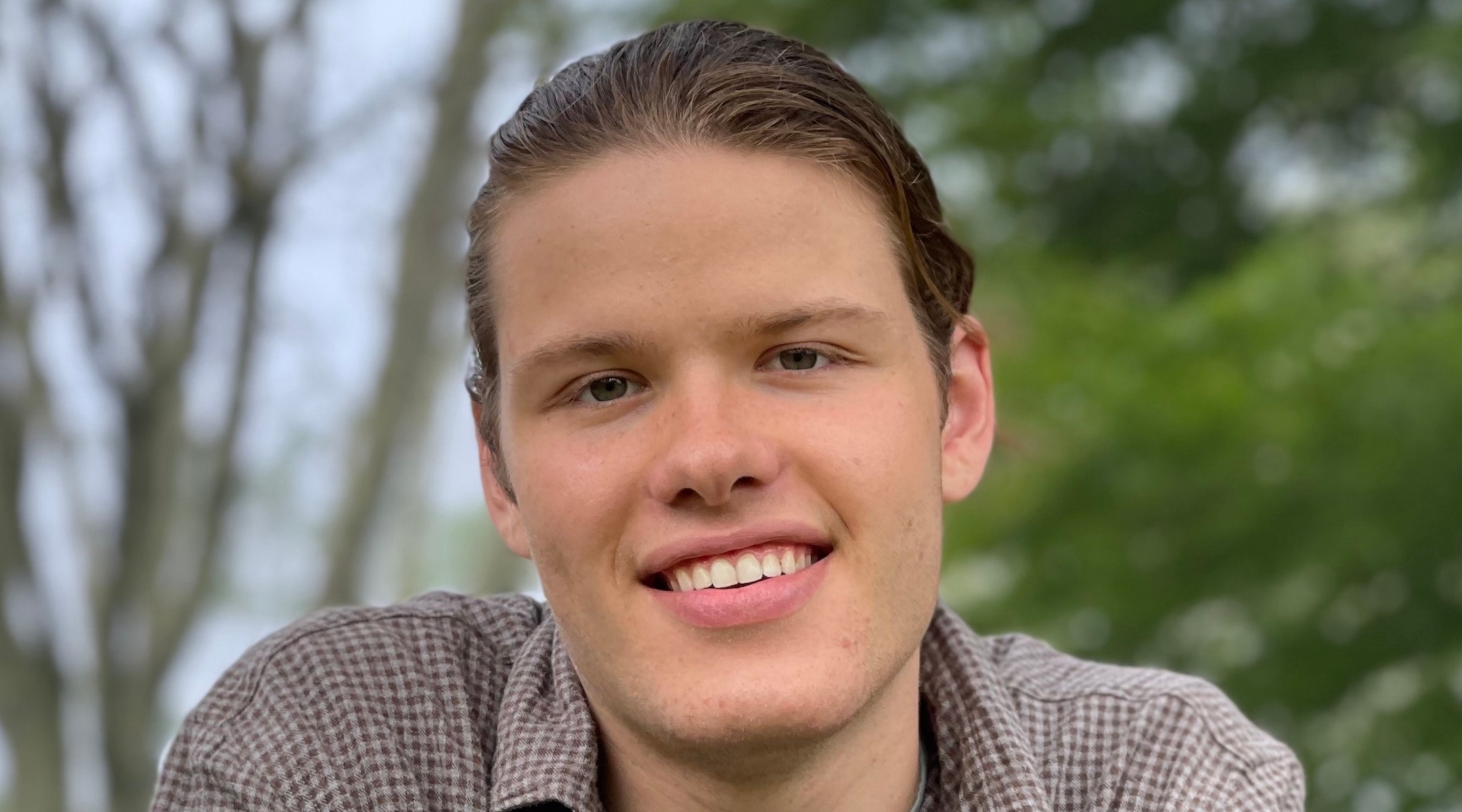
Isaac Sonnenfeldt (Courtesy)
Isaac Goldman Sonnenfeldt (junior from New York City studying environmental studies): Most of us came to this project through the Narrow Bridge Project. It is a close intimate learning group of politically diverse Jewish students who are coming together to engage with these issues on a pretty intellectual academic level.
From that experience in that class, a lot of us were hungry to continue that learning and find a way to dive deeper for ourselves and create meaning for other people as well. We were engaging with issues and answering questions that we had felt discomfort with ourselves and saw amongst our peers.
How do you define that discomfort?
Sonnenfeldt: My discomfort definitely was in coming to Brown from what had always been majority Jewish spaces growing up, like on the Upper West Side, going to a Jewish day school, switching to a secular school that was still majority Jewish. I had never really engaged with any of these issues as a Jew in the minority, if that makes sense. And especially coming to Brown and being more on the Zionist spectrum than not.
I didn’t necessarily feel that I was being attacked, but just being uncomfortable being in the minority for the first time and sort of coming into a new setting with new peers, a lot more ideas, people engaging on different levels than I had experienced before. There wasn’t just tacit agreement on Zionism everywhere. I was feeling discomfort over my own unpreparedness for those discussions and also feeling like I was in the minority.
What are some examples of some of the discomfort that the guidebook is trying to address?
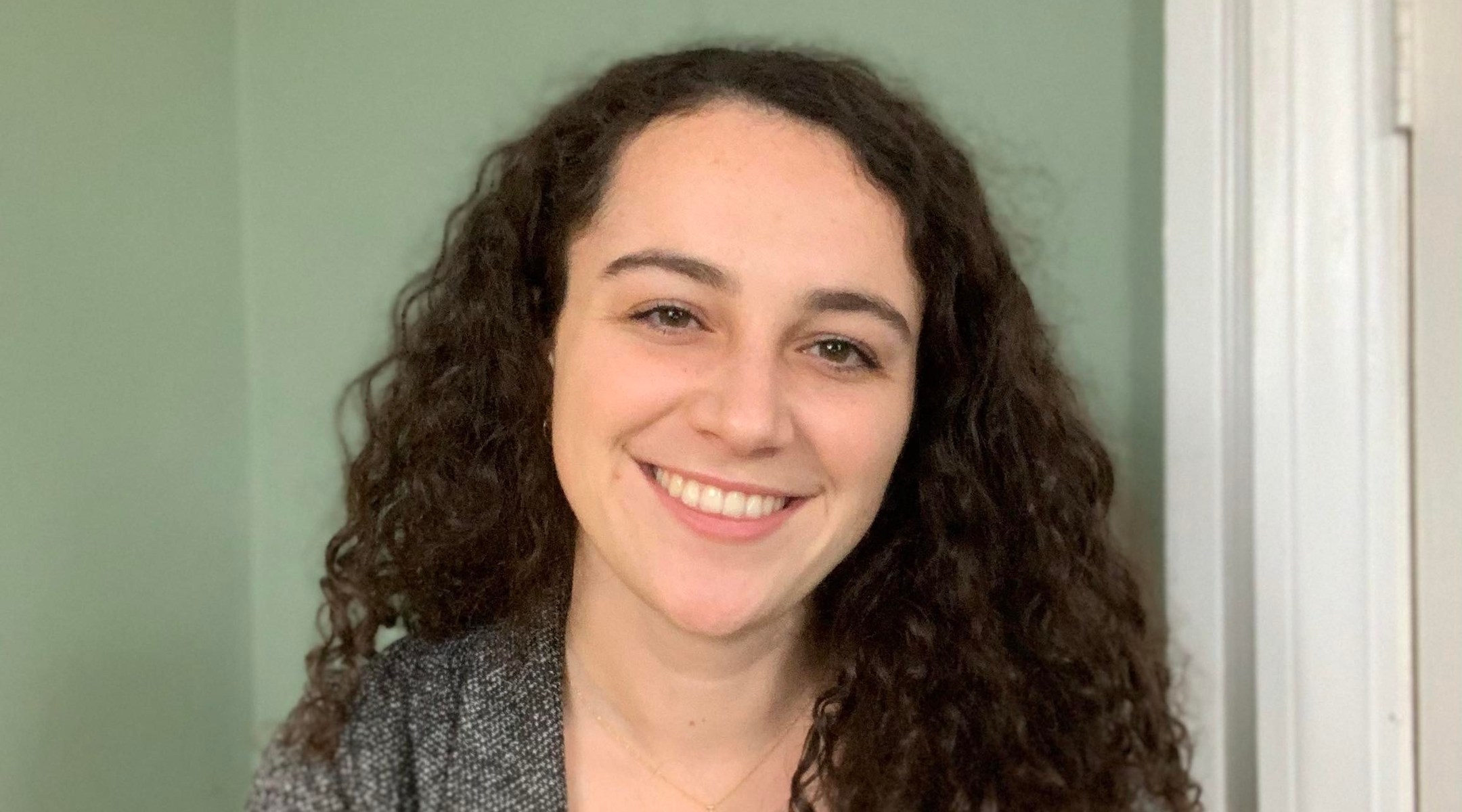
Maya Dayan (Courtesy)
Maya Dayan (a 2021 graduate from Boulder, Colorado, who studied applied math and public policy): I come from an Israeli family. I was born in Israel, but raised in Colorado. And then, through a few different life experiences, I found myself pretty firmly in the anti-Zionist camp. I also have family by extension in Jewish Voice for Peace. So a lot of very left-wing sentiments, and I think the main part of what I tried to do is be in the room with Palestinians. I made a very close Palestinian friend when I was in an international boarding school in rural Maharashtra, India, called United World College.
Since then, one of my main priorities was engaging in places where Palestinians are and I think part of the discomfort obviously comes when we are talking in abstract terms about Israel, it can feel disconnected from the reality of my family. And then on the other side of the debate, when other Zionist people in the U.S. or my family talk about the conflict with abstract terms about Palestinians, it feels like they are ignoring the reality of my friends living there. And I think that’s where a lot of my discomfort stems from.
Anyone either want to respond, or maybe they find themselves in a different place than Maya.
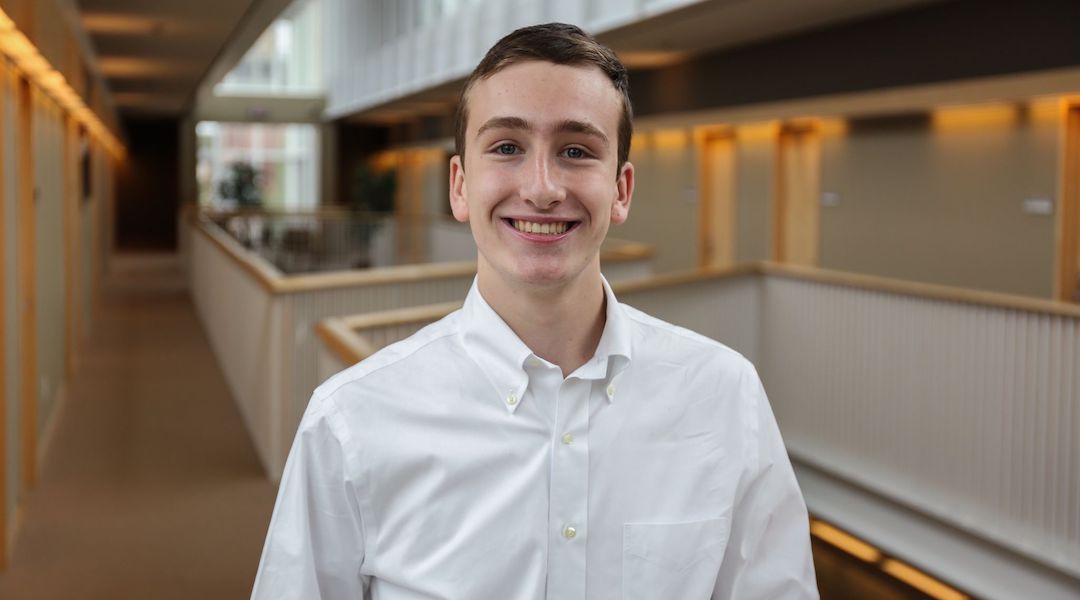
Andrew Steinberg (Courtesy)
Andrew Steinberg (junior from Newton, Massachusetts, studying international and public affairs): The lightning that catalyzed this, for me, personally, was the Brown Divest campaign in 2019, which put all of these issues and -isms at the forefront of Brown discourse, and certainly made us see a need for better dialogue from both sides. There’s a lot of bad-faith arguments on both sides. Like the allegation that Judaism is just a religion, or even on the Zionist side, when they say, like, “Palestinians, you rejected the state in 1948, therefore you kind of get what you get.” This is awful to people who are suffering through very real oppression. A lot of people are removed from each other. I’m not just talking about outside the Jewish community, but even inside the Jewish community.
Our group is a microcosm for conversations we hope other Jewish communities are having. Because it’s so easy when you’re attached to an organization or a movement to feel like you have to represent that movement and you’re not an individual, and you’re always a warrior. You’re always an ambassador, and you’re not like a thinker or a healer. And I think that this process has really allowed us to humanize each other in a way where the merits of our arguments are actually tested. And we have to confront hard truths.
I haven’t been on a college campus in a long time. Help me understand among Jewish students what some of the points of tension or disagreements are in talking about antisemitism.
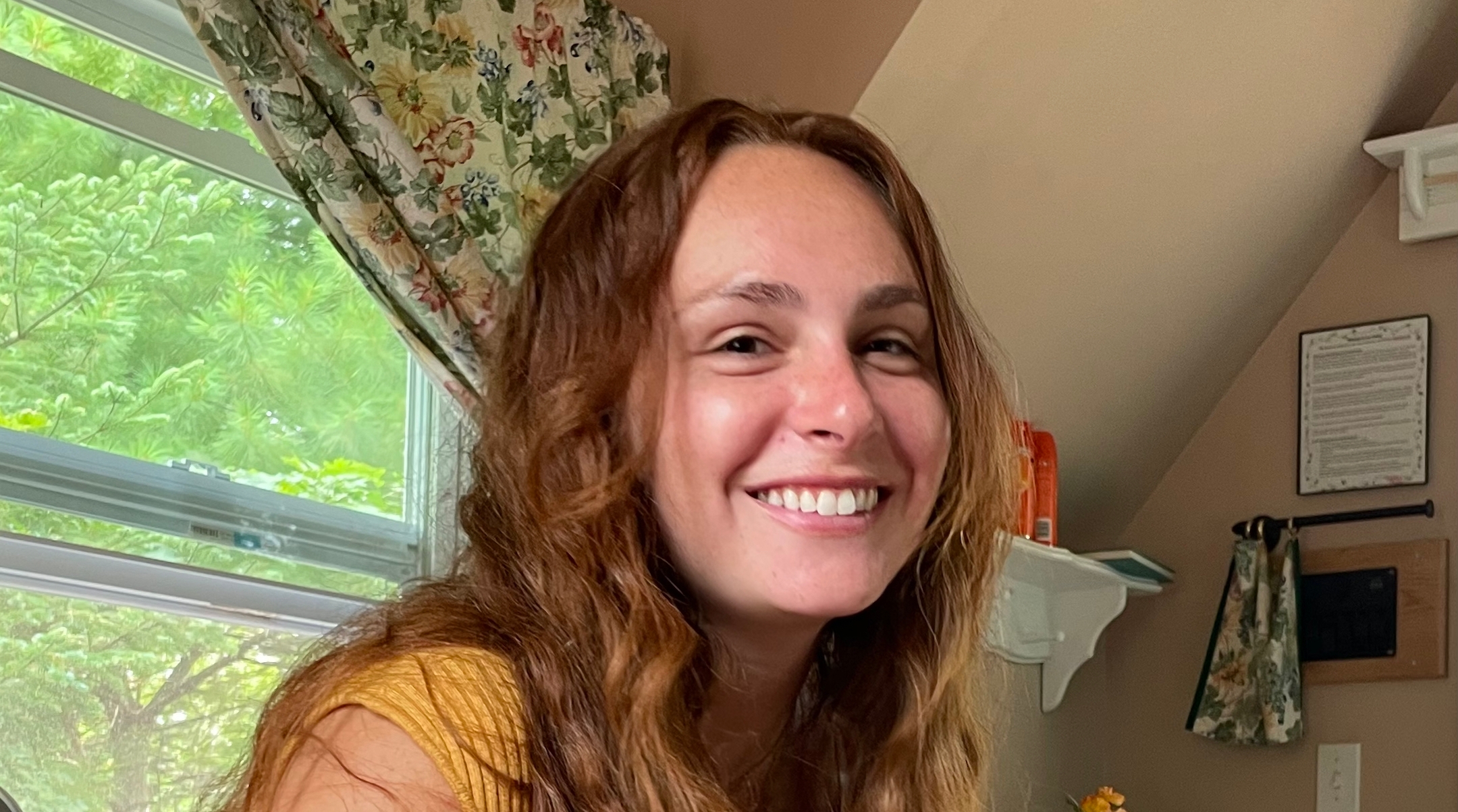
Hannah Gelman (Courtesy)
Hannah Gelman (junior from New Orleans studying religious and Judaic studies): It comes up everywhere is really the short answer. But it doesn’t always read the same way. This 130-page book is the tip of the iceberg on antisemitism on college campuses. Because it doesn’t always look the same way.
At Brown, students are very politically minded and very passionate but also sometimes harsh in their political fervor. So in left-wing activist spaces, for example, there might be ostracism of Jews who identify as Zionist, or just assumptions that Jews identify as Zionist and then ostracism follows.
You felt that at Brown?
Gelman: I have felt that, and in right-wing spaces too, an ostracism where, for example, a non-Zionist Jew might be considered a “worse” of a Jew. I’m a Judaic studies major and a religious studies major, and in a lot of my classes, I feel there is a delegitimization of Jews as an actually oppressed group. People don’t know how to talk about that with the right sort of attention.
I mostly come to Judaism from a religious place, and less through political activism. My way in is religious participation. Nevertheless, there are sometimes implicit, sometimes explicit, lines being drawn by people not knowing how to talk about Jews and not understanding the nuance of Jewish peoplehood and Jewish experience in history, and how that fits into everything else we tend to talk about in a liberal university like Brown.
What are some of the tensions you see among Jews themselves, in not understanding how to define antisemitism?
Danan: I think the biggest thing that we realized as a group is that the way that Zionists define Zionism is not perfectly opposite to the way anti-Zionists define anti-Zionism! Very liberal Jews define their Zionism as really rooted in Jewish safety, whereas anti-Zionists define [their movement] as Palestinian liberation. They look at the way that the Jewish state itself has impacted the lives of Palestinians, while not being actively against Jewish safety. But if you identify with the word “Zionist” as being about Jewish safety, and you hear someone come out as anti-Zionist, that sounds antisemitic to you, that’s a threat to your safety.
That, I think, is the fundamental disconnect that comes across: a lack of nuance around talking about Israel, and what that means to Jewish people. It’s not the same as just another nation state. And yet also when you talk about Palestinians I think we all got very comfortable with using terms like ethnic cleansing and settler colonialism when it comes to the manifestation of the Zionist state, and the way you cannot separate Zionism from the pain inflicted on Palestinians.
I think I have the unique experience in the room. I was part of Brown Divest and a supporter of it. I also was a member of Students for Justice in Palestine. Again, I want to be in the room with Palestinians. So I chose to sit in on all those meetings and be a part of the cultural events that they created. And one of the parts that was really hard about Jewish identity at Brown and where it gets super messy again is that Hillel, after the passing of Brown Divest, spoke out against it. There was an email that was sent out basically saying that this was like something against the Jewish community and that we had to stick together in this time of solidarity. It was very alienating. But that was also how Rabbi Dardashti and I ended up connecting, which led to my involvement in this project.
Would anyone comment on something in the document that represented a compromise for you personally, in the sense that it was a really hard place for you to get to?
Steinberg: When Maya says like we’re all quote, “comfortable” with terms like ethnic cleansing and colonialism, I don’t think she speaks for everybody. I think those terms are uncomfortable to me. That doesn’t mean that they’re inherently untruthful. It just means they have to be litigated and put in position of other terms like “self-determination” and “Jewish liberation.” I mean, the side of things that she presents, I had to investigate from a historical and sociological perspective. And sometimes I had to be like, “This is true, and this as a narrative is legitimate, but it’s not the only legitimate narrative.” But given how polarized this discourse is, even acknowledging that the other -isms exist or can be valid is seen as an attack on your isms.
We had a meeting at Hillel with Roots, an organization promoting dialogue between Israeli settlers and Palestinian activists, and I want to give them credit for this term: the “hubris of exclusivity,” meaning that your narrative is the only narrative that is true. Yes, there also can be another truth that you have to grapple with. That’s uncomfortable.
Danan: The social media section was difficult for me, as sometimes I knew who had made the posts we labelled as antisemitic. I was much more comfortable in the presentation format we had in April, where we presented these quotes and opened a discussion on why certain rhetoric is offensive and how we’d encourage people to rephrase it. It was difficult for me having to put our assessments into black and white in that section. Regardless, when seen in the broader context of the resource, I think it’s clear our intent is to educate people, not call them out.
Sonnenfeldt: I don’t think that any of us came into this because we’re like, wow, this is going to be such a comforting experience. I think we want to push people and we pushed ourselves. Being in that space of discomfort is when we can actually start challenging our own assumptions and getting work done. It was a process, for me personally, of working through my own biases, and each of us coming to the table with our own blind spots and educating ourselves and in turn being able to educate other students on other college campuses and the broader community around these topics.
Elana, if you will: Give an example of one of your own personal blind spots.
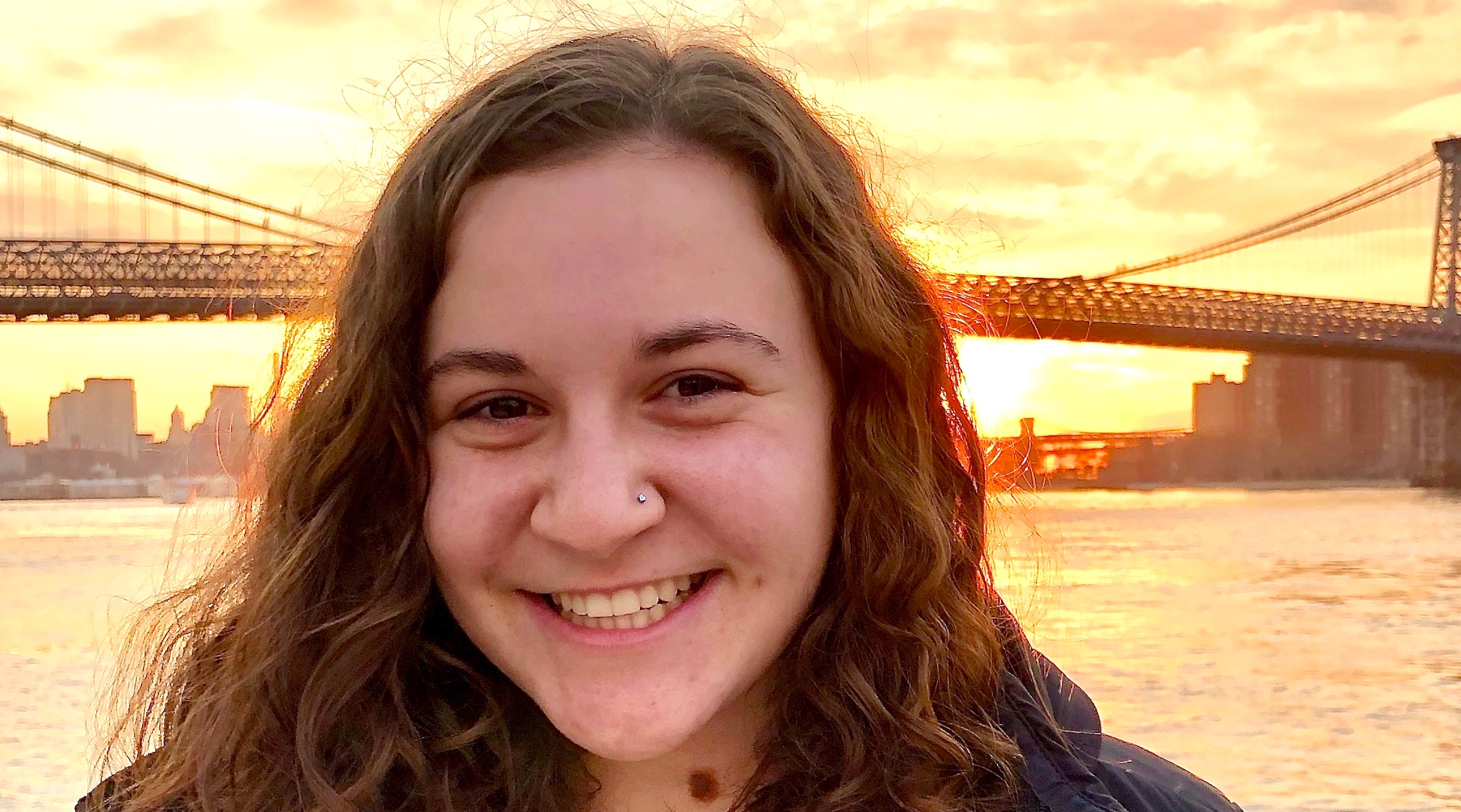
Elana Nussbaum Cohen (Courtesy)
Elana Nussbaum Cohen (sophomore from Brooklyn studying sociology): I attended Jewish day school for 13 years and had so much Israel education, and I knew the words to Israel’s national anthem by heart before I even knew the words to the American national anthem. And it wasn’t until really the end of high school and college that I started to realize that there was a whole narrative being excluded from my education. And it wasn’t my fault, either. It wasn’t like I was doing something wrong. I was just a Jewish kid going to Jewish day school. These were values that my family wanted to instill in me and I was kind of shocked and upset about the lack of perspective I had gotten in my 13 years of Jewish education — truths about the occupation and about the present state of Israel.
So when I came to college, and these issues were at the forefront of campus activism, and the global solidarity for Palestine was being connected to other global movements for justice, I was totally confused and felt like I didn’t even have the resources to be able to justify my own opinion, because I felt like all of my education was completely one-sided. And so it was a real project for me, and a personal challenge to enter into spaces that were uncomfortable and educate myself in order to be a better activist, in order to be a better Jew and Zionist.
Who do you want to see this guide and how would you like it being used?
Sonnenfeldt: We want this to be available to people like us who come to a college campus and are engaging with these issues for the first time. And they’re like, “I don’t know the history of this,” or “What is antisemitism?” “Why is everyone yelling about it?” One of the greatest value-adds of this is that it’s from a student perspective. Maybe there’s a divestment referendum, maybe there are warring factions within the Jewish community on campus, and this is a great place to start and you can exit feeling like you actually understand a little bit and you know what to look for next, as opposed to just like diving headfirst into something that seems like it’s impossible to navigate.
Gelman: I think internal geography in the U.S. is really relevant to Jewish experience. I lived in New Orleans my whole life, and then I moved to Providence for school. And that was an eye-opening thing. My Jewish experience is vastly different just because of where I’m from. The antisemitism in the south is more like the antisemitism described in the first half of the book — you know, more directed towards schools that need more education about issues like religious antisemitism and economic antisemitism. The second half of the book is more for college campuses where there’s a lot of Israel activism and people are confused about when it’s okay to say you’re a Zionist and when it’s not.
Jewish organizations make that distinction, between the “new” antisemitism related to Israel and the old antisemitism of conspiracy theories and killing Jesus. How useful is that?
Steinberg: Going off of what Hannah said, this resource is for people who, especially young people, who are or should be invested in having better conversations about antisemitism and Israel/Palestine. Anti-Zionist slash pro-Palestinian activists are very tired of just being labeled as antisemites or as irreconcilable, prejudiced people. And many of them, if you speak to them, they’re mostly concerned about, “How do I stop a soldier barging down my friend’s door in the middle of the night and traumatizing his kids, or how do I not go through a checkpoint,” which is dehumanizing. They’re very concerned with on-the-ground stuff. There might be some prejudiced people, don’t get me wrong, and people have blind spots. But I think to dismiss every pro-Palestinian advocate as antisemitic is lazy, and it doesn’t address the key concerns that those people have and I just think creates a cycle of emotional violence.
On the other side, when I see in my classes that Zionism is used in the same sentence as apartheid South Africa — that makes me feel awful, because my definitions are different. My version of Zionism is self-determination for people who are from a land. It’s very uncomfortable hearing very un-nuanced and invalidating things about what I see as a positive movement. It’s like an education group on Brown’s campus posting BDS stuff when it was popular back in May. How do I then be part of this movement for, like, better public school education? If it’s vehemently anti-Zionist, how do I even bring this up to leadership without sounding whiny or not an ally? That’s what you’re trying to avoid. You actually want to have substance behind why you think the way you do without just saying “that’s an -ism, you’re prejudiced.” You want the ability and courage to speak up constructively.
Outside Jewish organizations like to paint college campuses, especially the elite liberal arts colleges, as kind of hotbeds of antisemitism and anti-Zionism. Is this an exaggeration, and can they do more harm than good by taking away your agency?
Sonnenfeldt: I think definitely Israel, Palestine and antisemitism are important topics of discussion on college campuses. Do I think that college campuses writ large are hotbeds of antisemitism? Absolutely not. This resource is not meant to say, “Look at all these antisemitic college students and faculty and organizations.” A lot of people are confused. They don’t understand, necessarily, the impact of their words, and people are yelling past each other, which is when antisemitism can be both unintentionally fostered and perpetuated and also perceived when it’s not there.
In general, how do you feel about outside groups when they come in, whether it’s to file a Title VI lawsuit or telling you what you’re doing right and wrong?
Gelman: I certainly feel like I have agency on a practical level. I don’t feel silenced, but when broader organizations dub schools as “evil,” etc., that does feel like it takes a little bit of my own agency away. On a student-to-student level, I don’t feel like those sort of institutional proclamations limit my ability to be heard. But on a more global scope, sweeping characterizations or unproductive polarization erase a lot of the experiences and a lot of the work that students are doing in our generation to try to make this much less of a black and white conversation. That’s really frustrating and stomps on the work that I and a lot of my peers are trying to do when we try to be more caring and justice-oriented Jews, but also just people.
Steinberg: If I could just add on to that as someone who was in Brown Students for Israel and worked with these types of groups: There’s a time and place for everything. I think a lot of times these organizations view students as frontline soldiers, and not necessarily as partners. Ultimately, the lesson for outside organizations is to treat students as adults and as partners and consult with them before you go in. If you’re there to support Jewish students, ask Jewish students how you can support them. I think that’s the biggest thing.
Sonnenfeldt: When it comes to outside organizations coming in, I just want to acknowledge our relative privilege of having a mentor like Rabbi Dardashti and infrastructure like the Narrow Bridge Project and Dorot Foundation funding, and such a robust Jewish student organization at Brown that has allowed all of us to engage in this way. We are operating from a very privileged position where we actually have the resources and mentors and spaces to engage in this type of activism. I have a twin sister who goes to Williams College; there’s not nearly as much Jewish infrastructure there. And two years ago when they were denied the right to start a Jewish club, there was no infrastructure to help them. In those sorts of scenarios, outside organizations can be really helpful.
Steinberg: I just want to say one more thing because I’ve been thinking about this. It’s been a little bit like free love throughout this conversation. I do really love everybody here, but I want to recognize my main point, which is to acknowledge that before coming into this conversation, I was a very hardline, black-and-white [person who] could not conceive of how an anti-Zionist could not be an overtly antisemitic person. I just could not entertain that as a concept. And so, I have grown in my ability to just entertain other people’s opinions, even if I still disagree with them. That is the value of this project.
—
The post What happened when Jewish students at Brown University stopped fighting about Israel and started listening to each other appeared first on Jewish Telegraphic Agency.
















